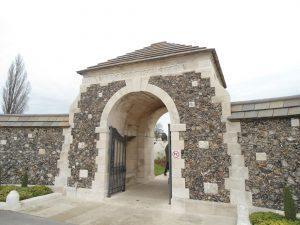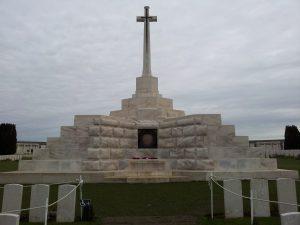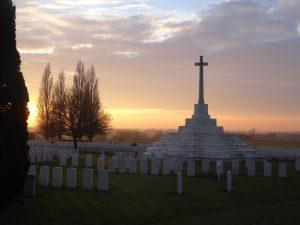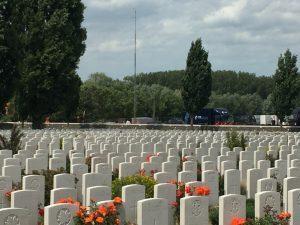CWGC – History Information
Tyne Cot or Tyne Cottage was a barn named by the Northumberland Fusiliers which stood near the level crossing on the road from Passchendaele to Broodseinde. Around it were a number of blockhouses or ‘pillboxes’. The barn, which had become the centre of five or six German blockhouses, or pillboxes, was captured by the 3rd Australian Division on 4 October 1917 in the advance on Passchendaele.
The Tyne Cot Memorial is one of four memorials to the missing in Belgian Flanders which cover the area known as the Ypres Salient. Broadly speaking, the Salient stretched from Langemarck in the north to the northern edge in Ploegsteert Wood in the south, but it varied in area and shape throughout the war.
The Salient was formed during the First Battle of Ypres in October and November 1914, when a small British Expeditionary Force succeeded in securing the town before the onset of winter, pushing the German forces back to the Passchendaele Ridge. The Second Battle of Ypres began in April 1915 when the Germans released poison gas into the Allied lines north of Ypres. This was the first time gas had been used by either side and the violence of the attack forced an Allied withdrawal and a shortening of the line of defence. There was little more significant activity on this front until 1917, when in the Third Battle of Ypres an offensive was mounted by Commonwealth forces to divert German attention from a weakened French front further south. The initial attempt in June to dislodge the Germans from the Messines Ridge was a complete success, but the main assault north-eastward, which began at the end of July, quickly became a dogged struggle against determined opposition and the rapidly deteriorating weather. The campaign finally came to a close in November with the capture of Passchendaele. The German offensive of March 1918 met with some initial success, but was eventually checked and repulsed in a combined effort by the Allies in September. The battles of the Ypres Salient claimed many lives on both sides and it quickly became clear that the commemoration of members of the Commonwealth forces with no known grave would have to be divided between several different sites.
The site of the Menin Gate was chosen because of the hundreds of thousands of men who passed through it on their way to the battlefields. It commemorates those of all Commonwealth nations, except New Zealand, who died in the Salient, in the case of United Kingdom casualties before 16 August 1917 (with some exceptions). Those United Kingdom and New Zealand servicemen who died after that date are named on the memorial at Tyne Cot, a site which marks the furthest point reached by Commonwealth forces in Belgium until nearly the end of the war. Other New Zealand casualties are commemorated on memorials at Buttes New British Cemetery and Messines Ridge British Cemetery.
The Tyne Cot Memorial now bears the names of almost 35,000 officers and men whose graves are not known.
Incorporated within the Tyne Cot Memorial is the New Zealand Memorial commemorating the names of nearly 1,200 men who gave their lives in the Battle of Broodseinde and the Third Battle of Ypres in October 1917.
The memorial was unveiled by Sir Gilbert Dyett, the Australian soldier and veterans’ rights activist, on 20 June 1927.
Source © Commonwealth War Graves Commission – Tyne Cot Memorial
Local men commemorated at this memorial
DAFF George Edward– Aslackby Memorial
HARBY Walter Blankney (Scarborough) – Rippingale Memorial
HARE John Albert – Bourne Memorial
HEAD Arthur – Witham on the Hill Memorial and Bourne Memorial
HOLMES Harold – Witham on the Hill
HUNT George Edward – Haconby Memorial
KETTLE Stephen – Bourne Memorial
KETTLE Thomas – Bourne Memorial
MICHELSON William Smith – Bourne Memorial
PARKER Rupert Hardy – Morton Memorial
POLLARD Frederick Daff – Rippingale Memorial
PRIDMORE Harold Ranby – Bourne Memorial
RUDKIN Ernest Henry – Kirkby Underwood Memorial
SANDALL David – Baston Memorial
SMITH Ernest – Bourne Memorial
THORNTON Arthur – Bourne memorial
WATSON Arthur – Bourne Memorial
WELLS Charles Ernest – Witham on the Hill Memorial
WRIGHT George Edgar – Thurlby Memorial
WYER Edmund – Haconby Memorial







Photographs © South Lincolnshire War Memorials – December 2011, 2016 & 2017